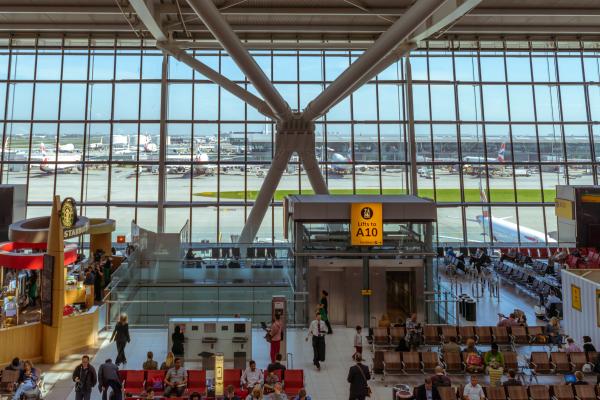GMB London calls for law change to allow Heathrow expansion

Turning the clock back to when air travel was a luxury out of the reach of ordinary people and restricting connectivity is a very backward step for humanity, says GMB London.
GMB London, the union for staff at London's airports, called on Parliament and Government to change the laws to focus on cutting carbon emissions from air transport rather than restricting the ability of a growing London population to travel. This follows the court ruling that expansion of Heathrow is against current climate change laws.
GMB reiterated it's comments earlier this month on the commitment by the UK Aviation industry to cut carbon emissions to net zero by 2050. See notes to editors below for copy of previous GMB London press release on this.
Warren Kenny, GMB London Regional Secretary, said:
"This decision is a direct result of Parliament and Government making climate change laws on the hoof without proper consideration of the true costs of achieving net zero carbon emissions by 2050.
“Parliament urgently needs to revisit the costs of the net zero carbon emissions and alternatives to turning the clock back on what sustains the prosperity of citizens.
“In particular, Parliament and government need to go back and change the laws to focus on cutting carbon emissions by the industry rather than cutting the ability of passengers to travel by air.
“The Aviation industry says that there is an alternative. The law should reflect this.
“Air travel has played a fundamental role in creating our contemporary networked world and restricting connectivity is a very backward step for humanity.
“So if this decision stands it is a very backward step for the population of London expected to grow to eleven million people by 2040. It will be negative for the economy of the entire country.
“There is no positive way of presenting this unwelcome decision.
“Unless the law is changed it will lead to an unwelcome rationing of air travel by a general strategy of pricing of it out of reach of ordinary people. It will be available only to those with way above average incomes.
“On the alternative frequent flyer tax it is very difficult to see it how could be operated without the introduction of a central government held data base containing the details of each and every flights taken by all citizens. This would be a very big “big brother” step to take - particularly if there are viable other alternatives to avoid such a drastic step.”
END
Notes to editors:Copy of previous GMB press release dated 3rd February 2020:
GMB LONDON WELCOME COMMITMENT BY UK AVIATION INDUSTRY TO CUT CARBON EMISSIONS TO NET ZERO BY 2050
The focus on cutting carbon emissions by the industry rather than cutting the ability of passengers to travel by air is welcome as it has played an fundamental role in creating our contemporary networked world says GMB London
GMB London, the union for workers at London Airports, welcomed the commitment by the UK Aviation industry to cut carbon emissions to net zero by 2050. See copy of the report on Press Association in notes to editors below.
Gary Pearce, GMB regional officer for airport workers, said:
“GMB London supports the UK meeting a target for net zero carbon emissions by 2050.
“GMB welcome this commitment by the UK aviation industry to meet a very challenging target for the industry to cut emissions to net zero by 2050.
“The plan is to achieve this aim by a mix of new green technologies and new green fuels and in addition by the offsetting of carbon emissions by planting trees.
“GMB London will engage with the industry to discuss each of these proposals and examine the scope for job creation that they entail particularly in other regions of the UK.
“GMB welcome this focus on cutting carbon emissions by the industry rather than cutting the ability of passengers to travel by air. Air travel has played a fundamental role in creating our contemporary networked world.
“GMB does not support those who want to ration air travel by a general strategy of pricing of it out of reach of ordinary people and available only to those with way above average incomes as they are turning the clock back.
“On the alternative frequent flyer tax it is very difficult to see it how could be operated without the introduction of a central government held data base containing the details of each and every flights taken by all citizens. This would be a very big “big brother” step to take - particularly if there are viable other alternatives to avoid such a drastic step.”
Copy of the report on Press Association:
PLEDGE TO CUT AVIATION CARBON EMISSIONS TO NET ZERO BY 2050
04 Feb 2020
By Neil Lancefield, PA Transport Correspondent.
The UK's aviation industry has pledged to reduce its net carbon emissions to zero by 2050.
More efficient aircraft and engines, sustainable aviation fuels and carbon offsetting schemes are among the measures featured in a Decarbonisation Road-Map.
The plan also includes modernising airspace and streamlined ground operations.
It was published by Sustainable Aviation, an alliance of firms and operators such as Heathrow Airport, British Airways, easyJet, Airbus and NATS.
It states that the sector can accommodate a 70% growth in passenger numbers by 2050 while reducing net carbon emissions levels from 30 million tonnes of CO2 per year to zero.
The aviation industry is under increasing pressure to reduce its carbon emissions due to environmental concerns.
Last week, US firm Wright Electric - which is collaborating with easyJet to manufacture an electric airliner - announced it has started engine development for a 186-seater plane, and hopes to begin test flights in 2023.
British Airways is investing in a scheme to generate sustainable jet fuel from household and commercial waste.
Sustainable Aviation chairman Neil Robinson acknowledged that climate change is a "clear and pressing issue" for people, businesses and governments around the world.
He went on: "We know aviation emissions will increase if decisive action is not taken, and that's why UK aviation [ ]today commits to achieving net zero carbon emissions by 2050, through an international approach, working with governments around the world and through the UN.
"The UK is well positioned to become one of the leaders in the green technologies of the future."
Transport Secretary Grant Shapps said: "The fight against climate change is one of the greatest challenges facing the modern world, but the aviation sector's commitment [ ]today is a huge step forward in creating a greener future.
"Aviation has a crucial role to play in reducing carbon emissions, and with the help of new technologies, renewable fuels and our continued international co-operation through the UN agency, the International Civil Aviation Organisation, we'll be able to strike that balance, creating a greener and cleaner future."


